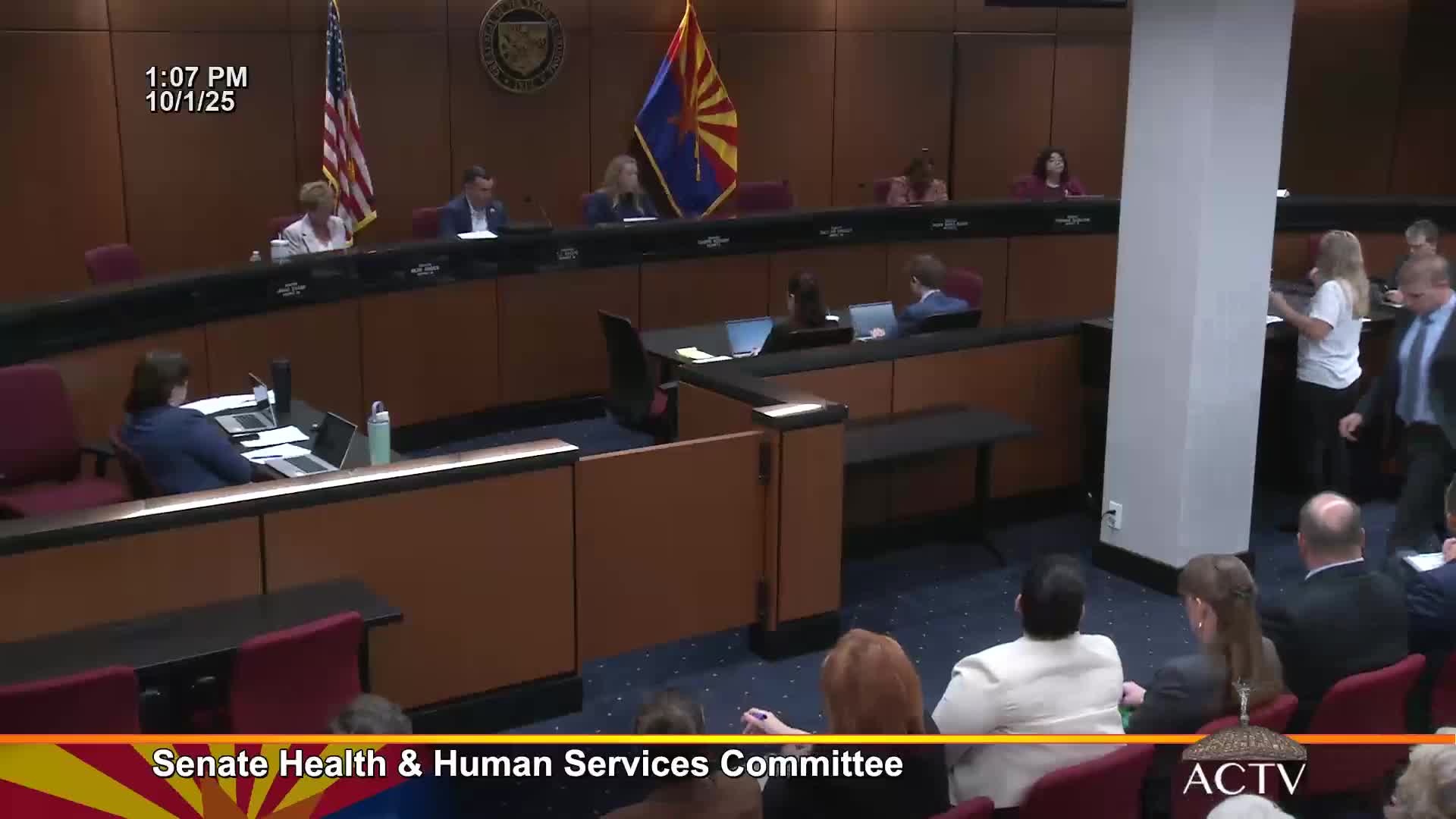Advocates tell senators death of Arizona man underscores gaps in SMI residential treatment and court oversight
October 01, 2025 | 2025 Legislature Arizona, Arizona
This article was created by AI summarizing key points discussed. AI makes mistakes, so for full details and context, please refer to the video of the full meeting. Please report any errors so we can fix them. Report an error »

PHOENIX — Family members and mental-health advocates opened an Arizona Senate Health and Human Services Committee hearing with testimony about the death of Larry Bootsma, a man with schizophrenia and a traumatic brain injury, whose parents and advocates said he died after repeated system failures.
Rachel Stryfe, speaking on behalf of Helen and Elverne Bootsma and as co-founder of Arizona Mad Moms, said Larry was found dead at a Phoenix bus stop hours after visiting his clinic. Stryfe told the committee that Larry had an Assertive Community Treatment (ACT) team and a public fiduciary guardian but still cycled through hospitals, lived outdoors and lacked secure residential care.
"No measurement of outcomes, no real care. This is waste, fraud, abuse, and neglect in real time," Stryfe said, attributing part of the problem to what she described as the legislature's failure to fully fund secure residential treatment. Stryfe and other witnesses cited a sequence of budget reductions: testimony said a proposed $25 million appropriation was reduced to $5 million and later to $3.5 million after internal reallocation; witnesses presented those figures as the reason secure treatment capacity remained insufficient.
Witnesses also raised long-term changes in hospital capacity, noting that the state closed a large share of hospital beds since the Arnold v. Sarn litigation and that supported-housing units promised by that settlement had not kept pace with population growth. "In Arizona, SMI are 32 times more likely to be jailed than hospitalized," Stryfe said at the hearing.
Senators and witnesses described both short-term and structural remedies: increased funding for court-ordered evaluation beds and residential treatment, better court oversight of ACT teams, and stronger support for public fiduciary offices. Chairwoman Michelle Warner framed the committee's responsibility as ensuring access to care and protecting taxpayer dollars.
Why it matters: Witnesses placed Bootsma's death in the context of systemic underinvestment in serious mental illness (SMI) services and gaps in accountability for treatment outcomes. The testimony linked budget choices and policy decisions to immediate patient harm.
What's next: The Bootsma testimony was part of a larger hearing on behavioral-health fraud and oversight; committee members directed continued investigation and oversight. The hearing record includes calls for concrete funding and policy changes to expand secure-treatment capacity and improve court and guardianship oversight.
Provenance: Testimony by Rachel Stryfe (Arizona Mad Moms) and introductory remarks by Chair Michelle Warner.
Rachel Stryfe, speaking on behalf of Helen and Elverne Bootsma and as co-founder of Arizona Mad Moms, said Larry was found dead at a Phoenix bus stop hours after visiting his clinic. Stryfe told the committee that Larry had an Assertive Community Treatment (ACT) team and a public fiduciary guardian but still cycled through hospitals, lived outdoors and lacked secure residential care.
"No measurement of outcomes, no real care. This is waste, fraud, abuse, and neglect in real time," Stryfe said, attributing part of the problem to what she described as the legislature's failure to fully fund secure residential treatment. Stryfe and other witnesses cited a sequence of budget reductions: testimony said a proposed $25 million appropriation was reduced to $5 million and later to $3.5 million after internal reallocation; witnesses presented those figures as the reason secure treatment capacity remained insufficient.
Witnesses also raised long-term changes in hospital capacity, noting that the state closed a large share of hospital beds since the Arnold v. Sarn litigation and that supported-housing units promised by that settlement had not kept pace with population growth. "In Arizona, SMI are 32 times more likely to be jailed than hospitalized," Stryfe said at the hearing.
Senators and witnesses described both short-term and structural remedies: increased funding for court-ordered evaluation beds and residential treatment, better court oversight of ACT teams, and stronger support for public fiduciary offices. Chairwoman Michelle Warner framed the committee's responsibility as ensuring access to care and protecting taxpayer dollars.
Why it matters: Witnesses placed Bootsma's death in the context of systemic underinvestment in serious mental illness (SMI) services and gaps in accountability for treatment outcomes. The testimony linked budget choices and policy decisions to immediate patient harm.
What's next: The Bootsma testimony was part of a larger hearing on behavioral-health fraud and oversight; committee members directed continued investigation and oversight. The hearing record includes calls for concrete funding and policy changes to expand secure-treatment capacity and improve court and guardianship oversight.
Provenance: Testimony by Rachel Stryfe (Arizona Mad Moms) and introductory remarks by Chair Michelle Warner.
View full meeting
This article is based on a recent meeting—watch the full video and explore the complete transcript for deeper insights into the discussion.
View full meeting
